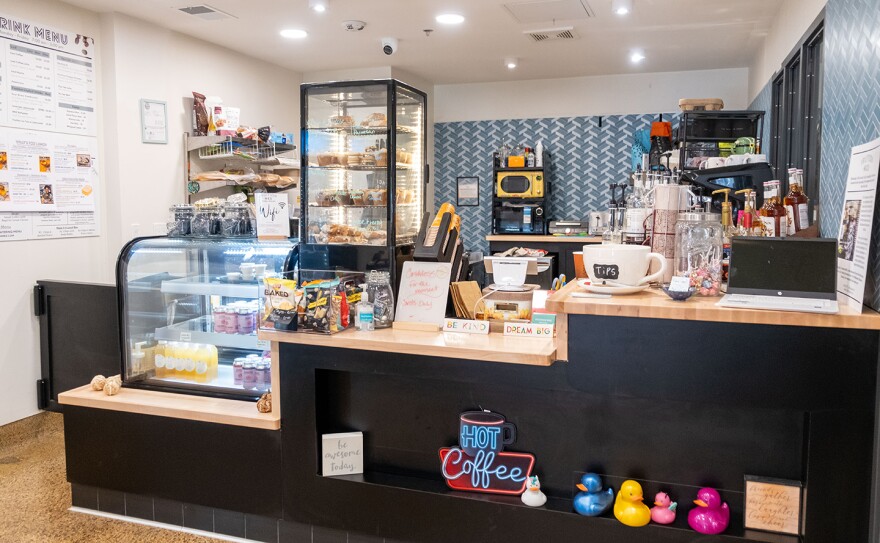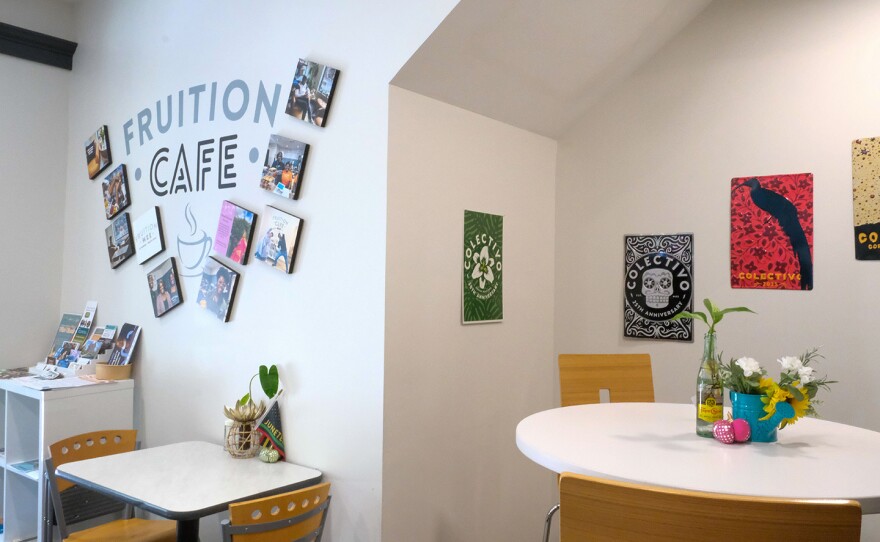They lift your spirits, prompt you to think, make you feel grateful and inspire you to do more. They connect you to our community, shining a spotlight on what's good about our city. They're stories that are Uniquely Milwaukee, sponsored by the Milwaukee Public Library.
Everybody needs nourishment. It’s at the top of the list for survival. But it’s not the end of the list. Tiffany Miller was well aware of that as she made plans for what would become Fruition Cafe.
Located in the Concordia 27 Building on the corner of 27th and Wells, the space opened in July 2024 with what you’d expect from the name: coffee, tea, kombucha, baked goods, and protein-packed sandwiches and wraps.
Then there’s the less-expected aspect: a place for the city’s creative minds to express themselves.
Along with the recent opening of Third Space Collective MKE, Fruition Cafe has helped bring a bigger artistic presence to the Near West Side with its unique approach. Not only does it provide nourishment for the body through healthy food made locally, but it also nourishes the spirit by inspiring joy and building a community — and a business — around a particular feeling.
As Miller explained, “Fruition is a place that is intended to restore, create and amplify joy.”
Triple threat
The cafe and creative space opened in July 2024 in the Concordia 27 Building on the corner of 27th and Wells. The threefold business includes the cafe aspect that’s open to the public, as well as a makerspace, co-working space and private conference room that are available to members first (options range from day passes to annual plans) and the general public during community events.
Although every part of the business is important, the cafe plays a major role in promoting access to local, homemade, healthy food. A prime example is Miller’s team-up with TrueMan McGee, founder of Funky Fresh Spring Rolls. She sees him as a mentor, and he was happy to help her build a protein-packed breakfast menu.
“I've been a supporter of Tiffany through everything she's done,” McGee said, “and when she's getting into my world of culinary creations, I definitely want to be supportive to her. … I think she's done a pretty great job so far of bringing a well-needed space to the Near West Side.”

Making the accomplishment even more impressive is that prior to Fruition, Tiffany didn’t have any culinary experience. But she didn’t let that hold her back. “I don't have a culinary degree,” she said. “I've never worked in a restaurant, never been a barista, none of that. But I'm a creative, and creatives can figure out anything if they want, if they have that curiosity.”
Right down the hall from the cafe, that curiosity gets fed in the makerspace. Miller designed it to make sure “cost doesn’t inhibit creativity,” adding that finances are often the barrier that brings the creative process to a standstill. At Fruition, artists and creators of all skill levels can keep things moving with supplied materials ranging from basic art supplies to sewing machines to heat presses.
Across the corridor from the cafe is the co-working area — a quieter space flooded by natural light from the long windows, with comfortable seating options and even a giant Connect Four game for those breaks that often lead to breakthroughs. It’s another location within Fruition that invites collaboration and creativity.
A family tradition
Miller gets the chance to flex that side of her brain in other aspects of the business. You’ll see her art mixed in with other people’s work along the hallway, including nods to her family members. Primarily a textile artist, Miller has weaved her loved one into the fabric of Fruition, which makes an already personal space even more so. Even if she didn’t realize it until the project was well underway.
Miller’s grandmother had a restaurant called The Wagon Wheel in Arkansas, something the new cafe owner found out four months after Fruition opened. You’ll find her grandmother’s picture in the cafe, as well as one of her mom in the creative space.

The family feel is important throughout the business, but especially in the cafe, which has become an important resource in a neighborhood situated within a food desert. Convenience stores and fast-food options aren’t hard to find on the Near West Side. But affordable, healthy food is.
Grocery-store closures, a lack of investment in the area and limited access to transportation have led to food insecurity and diet-related health issues. You can see it on 27th Street, which has a high amount of traffic but limited fresh-food options.
“I live in a food desert, and I created this cafe in a food desert,” Miller said. “And to be able to start your day with something healthy — packed with veggies, packed with protein — is super important to me.”
Places like Fruition are tangible proof of what 27th Street can be. In that way, the business plays a major role not only providing access to food, but inviting people to get together and plan for the neighborhood’s future around a feeling that drives so much in Miller’s life.
“Come in, have a seat, have a cup of coffee, connect with some joy.”

















